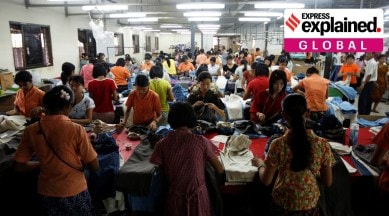Why global clothing retailers like H&M and Zara are exiting Myanmar
Myanmar’s garment industry has been in a crisis since the military coup in February 2021. While numerous factories have been permanently shut down, the working conditions have drastically deteriorated: wages have plummeted; working hours have spiked; labourers are being fired unfair.

The world’s second-largest clothing retailer H&M recently announced it would gradually phase out sourcing from Myanmar, days after an advocacy group revealed the increasing number of labour abuse cases in the country’s garment industry.
“After careful consideration, we have now taken the decision to gradually phase out our operations in Myanmar,” H&M told Reuters in an email. “We have been monitoring the latest developments in Myanmar very closely and we see increased challenges to conduct our operations according to our standards and requirements.”
monthly limit of free stories.
with an Express account.
Myanmar’s garment industry has been in a crisis since the military coup in February 2021. While numerous factories have permanently shut down, the working conditions have drastically deteriorated: wages have plummeted; working hours have spiked; labourers are being fired unfairly.
Major international clothing retailers cut ties with Myanmar
H&M isn’t the first brand to exit Myanmar due to the erosion of labour rights in the nation. Just weeks ago, Inditex, owner of the world’s biggest clothing retailer Zara, said it was in the process of stopping all purchases from the country. The announcement came after a vociferous campaign by the global workers’ union IndustriALL to convince companies to divest from Myanmar.
“Inditex is in the process of a phased and responsible exit from Myanmar, following IndustriALL’s call,” a company spokesperson said. “As a result, we continue to reduce the number of active manufacturers in the country.”
Earlier, Spanish fast fashion retailer Mango also announced to stop sourcing from the Southeast Asian country. In September last year, Irish retailer Primark said it would “begin working towards a responsible exit” as its “first priority is the safety and wellbeing of the people who make our clothes and products.” Marks & Spencer, a British brand, followed similar steps and laid out its exit plans in a statement published in October.
Garment industry in crisis
Before the Covid-19 pandemic, Myanmar’s clothing industry accounted for 28 per cent of total Burmese exports. It employed 700,000 people and was the country’s fastest-growing sector. The double crisis, first the pandemic and then the military coup, severely impacted the industry. According to the International Labor Organization (ILO), 220,000 garment workers, primarily women, were laid off in 2021. More than 50 factories temporarily shut down and around 13 permanently closed the same year, the Myanmar Garment Manufacturers Association (MGMA) said.
Moreover, several of the Chinese-owned factories were targeted by anti-coup protesters, trade union leaders were arrested and many trade unions, which opposed the coup, were disbanded by the military.
Most significantly, the crisis led to labour abuses in the industry. Business and Human Rights Resource Centre (BHRRC), a British human rights advocacy group, in a recent report, said that there has been a significant increase in labour and human rights abuses of garment workers across the country since the military takeover. The report documented 156 cases of alleged worker abuses in Myanmar garment factories from February 2022 to February 2023, up from 56 in the previous year.
It also noted, “Wage reduction and wage theft remain the most reported allegations (linked to over half of cases, 55%), followed by unfair dismissal (42% of cases) and inhumane work rates and forced (and often unpaid) overtime (42% of cases).” Gender-based violence and harassment, including verbal, psychological and physical abuse, and pregnancy discrimination, has also become prevalent. Several instances of women being threatened and unfairly dismissed for not meeting production targets have been documented, the report added.
No respite in sight
Many experts believe that international clothing retailers pulling out of Myanmar could leave workers there worse off. Hundreds if not thousands could lose their jobs, and working conditions may further deteriorate.
The European Union recently urged the companies to continue sourcing from the Southeast Asian country, while trying to protect the human rights of the industry workers. The EU funds a project in Myanmar called MADE, which aims to improve the working conditions in the factories. Seventeen well-known retailers are members of MADE, including H&M and Adidas, Reuters reported.